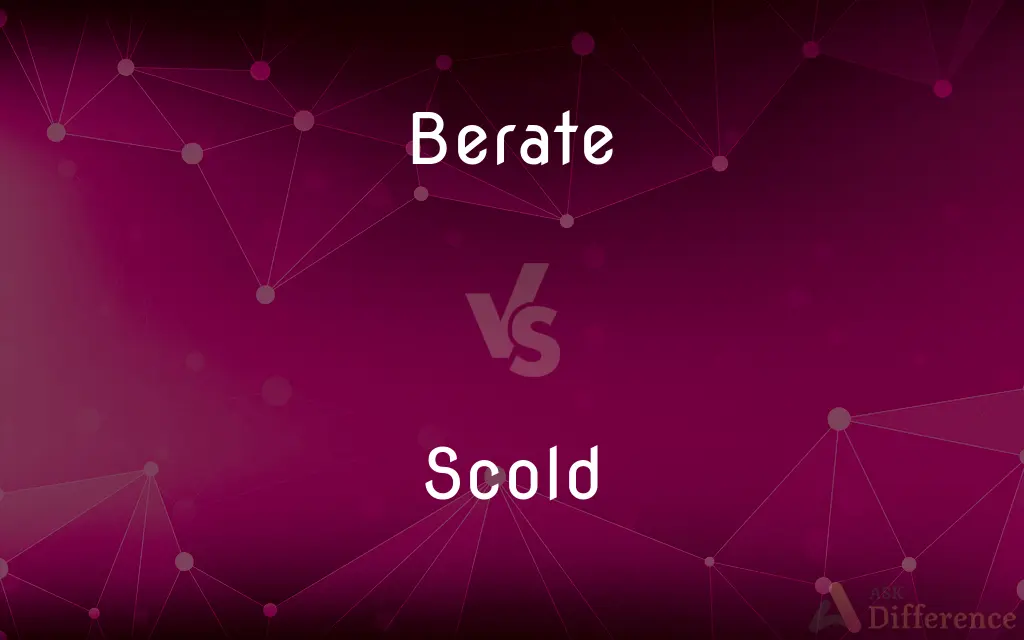Berate vs. Scold — What's the Difference?
By Maham Liaqat & Fiza Rafique — Updated on April 9, 2024
Berating involves harsh and prolonged criticism, while scolding is generally a brief and less severe reprimand.

Difference Between Berate and Scold
Table of Contents
ADVERTISEMENT
Key Differences
Berating is characterized by intense and prolonged criticism, often delivered in a loud and aggressive manner. It goes beyond a simple reprimand to include a significant emotional charge and is meant to convey strong disapproval or disappointment. Scolding, on the other hand, tends to be a shorter, less intense form of reprimand. It's more about correcting behavior with immediate feedback and usually lacks the prolonged emotional intensity found in berating.
When someone berates another, it often reflects not just disappointment in a single action but can also imply dissatisfaction with the person's overall behavior or character. This can have a profound psychological impact on the recipient, potentially affecting their self-esteem and confidence. Whereas scolding is more commonly used in everyday situations to address specific actions or behaviors and is generally less damaging to an individual's self-perception.
Berating is less common in professional settings, as it can create a hostile work environment and negatively impact team dynamics and morale. In contrast, scolding, when done constructively, can be part of effective management and discipline strategies in both professional and personal contexts. It's seen as a way to guide or correct behavior without causing significant emotional distress.
The choice between berating and scolding often reflects the seriousness of the situation and the desired outcome. Berating may be used in more severe cases where the behavior in question is significantly harmful or repeated, necessitating a strong response. On the other hand, scolding is often sufficient for minor infractions or first-time mistakes, aiming to correct the behavior without escalating the emotional stakes.
Berating tends to leave a lasting impact and can alter relationships permanently, leading to resentment or a breakdown in communication. In contrast, scolding, especially when followed by guidance or constructive feedback, can strengthen understanding and improve future interactions, making it a more sustainable approach to addressing undesirable behavior.
ADVERTISEMENT
Comparison Chart
Intensity
High, with prolonged criticism
Lower, often brief and to the point
Emotional Charge
Strong, often with anger or frustration
Milder, aimed at immediate correction
Duration
Long, can be drawn out
Short, usually addressing the immediate issue
Psychological Impact
Potentially damaging to self-esteem and confidence
Generally less damaging, corrective
Common Settings
Less common in professional settings, more severe cases
Professional and personal contexts for minor issues
Outcome
Can lead to resentment, affects relationships
Aims for behavioral correction, less impact on relationships
Compare with Definitions
Berate
To criticize someone fiercely and at length.
The coach berated the team for their lack of effort.
Scold
Aimed at immediate behavior correction without lasting harm.
He scolded the team but offered constructive feedback.
Berate
A verbal reprimand with strong emotional undertones.
She was berated for her mistake, leaving her feeling demoralized.
Scold
To reprimand someone with the intention of correcting behavior.
The mother scolded her child for running into the street.
Berate
Intense admonishment often reflecting deep disappointment.
The director berated the cast for the subpar performance.
Scold
A brief and direct form of discipline or criticism.
The manager scolded the employee for being late.
Berate
A prolonged attack on someone's actions or character.
He was publicly berated, which affected his confidence.
Scold
Can strengthen understanding and improve behavior.
After being scolded, she was more careful with her assignments.
Berate
Expressing disapproval in a loud and harsh manner.
The teacher berated the student, making an example of him.
Scold
Often used for minor infractions or mistakes.
She scolded the dog for barking at guests.
Berate
To rebuke or scold angrily and at length.
Scold
To reprimand or criticize harshly and usually angrily.
Berate
(transitive) to chide or scold vehemently
What society tells people, that they could "do whatever they want" to dissidents, and yet berates anyone for treating them well?
Scold
To express harsh or angry disapproval to someone.
Berate
To rate or chide vehemently; to scold.
Scold
One who persistently nags or criticizes
"As a critic gets older, he or she usually grows more tetchy and ... may even become a big-league scold" (James Wolcott).
Berate
Censure severely or angrily;
The mother scolded the child for entering a stranger's car
The deputy ragged the Prime Minister
The customer dressed down the waiter for bringing cold soup
Scold
A person who habitually scolds, in particular a troublesome and angry woman.
Scold
(ambitransitive) To rebuke angrily.
I advise that you refrain from using that kind of language at home, lest your mother scold you.
Scold
(ornithology) Of birds, to make harsh vocalisations in aggression.
Scold
Of birds, to make vocalisations that resemble human scolding.
Scold
Misconstruction of scald
Scold
To find fault or rail with rude clamor; to brawl; to utter harsh, rude, boisterous rebuke; to chide sharply or coarsely; - often with at; as, to scold at a servant.
Pardon me, lords, 't is the first time everI was forced to scold.
Scold
To chide with rudeness and clamor; to rate; also, to rebuke or reprove with severity.
Scold
One who scolds, or makes a practice of scolding; esp., a rude, clamorous woman; a shrew.
She is an irksome, brawling scold.
Scold
A scolding; a brawl.
Scold
Someone (especially a woman) who annoys people by constantly finding fault
Scold
Censure severely or angrily;
The mother scolded the child for entering a stranger's car
The deputy ragged the Prime Minister
The customer dressed down the waiter for bringing cold soup
Scold
Show one's unhappiness or critical attitude;
He scolded about anything that he thought was wrong
We grumbled about the increased work load
Common Curiosities
Does berating have a psychological impact?
Yes, berating can significantly affect someone's self-esteem, confidence, and mental health.
Are there situations where scolding is preferred over berating?
Scolding is often preferred for minor infractions or first-time mistakes, where the goal is to correct rather than punish.
How can one respond effectively to being berated?
Responding with calmness, seeking clarification, and addressing the issue constructively can be effective strategies.
Can scolding be effective in changing behavior?
Yes, scolding can be effective, especially when it is immediate, specific, and followed by constructive feedback.
How does the intensity of berating affect professional relationships?
Berating can create hostility and resentment, damaging professional relationships and team dynamics.
Is there a cultural aspect to preferring scolding over berating?
Cultural norms and values can influence the preference, with some cultures valuing more direct forms of criticism and others favoring a gentler approach.
What's the difference between berating and scolding?
Berating is a harsh, prolonged criticism, often with emotional intensity, while scolding is a brief, less severe form of reprimand aimed at immediate correction.
Is berating ever appropriate?
While it can convey strong disapproval, berating is generally less appropriate due to its potential to harm relationships and well-being.
Can the severity of the situation justify berating over scolding?
While severe situations may require a strong response, berating is still generally seen as less constructive than other forms of discipline.
What are the long-term effects of being frequently berated?
Frequent berating can lead to long-term psychological damage, including anxiety, depression, and low self-esteem.
What's the role of empathy in choosing between berating and scolding?
Empathy can guide the choice, with an empathetic approach favoring scolding that aims to correct rather than harm.
How do berating and scolding differ in educational settings?
In educational settings, scolding is more common, aiming to guide and correct, while berating is discouraged due to its negative impact on learning.
What are the consequences of inappropriate scolding in the workplace?
Inappropriate scolding can lead to resentment, decreased motivation, and a negative work environment.
How should managers balance the need to correct behavior with the potential negative effects of berating?
Managers should aim for constructive feedback, reserving scolding for immediate corrections and avoiding berating to maintain a positive work environment.
Can the way one scolds or berates change the outcome?
Yes, the manner and tone used can significantly impact the recipient's response and the overall outcome.
Share Your Discovery

Previous Comparison
Censored vs. Uncensored
Next Comparison
Bendable vs. MendableAuthor Spotlight
Written by
Maham LiaqatCo-written by
Fiza RafiqueFiza Rafique is a skilled content writer at AskDifference.com, where she meticulously refines and enhances written pieces. Drawing from her vast editorial expertise, Fiza ensures clarity, accuracy, and precision in every article. Passionate about language, she continually seeks to elevate the quality of content for readers worldwide.















































